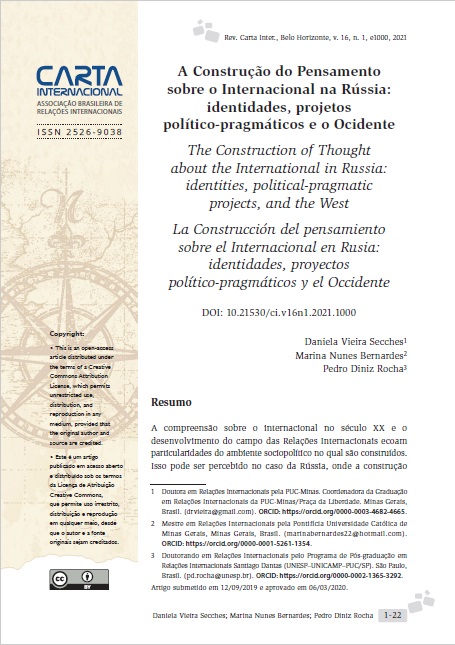The Construction of Thought about the International in Russia
identities, political-pragmatic projects, and the West
DOI:
https://doi.org/10.21530/ci.v16n1.2021.1000Abstract
In order to understand the development of disciplinary International Relations (IR) during the 20th century it is important to consider the sociopolitical reality that compose the context in which the discipline was built. What is particularly true for Russia, where IR was coupled with competing national projects that aimed to imitate the Western “other”, or counteract it. Having said that, the main goal of this article is to understand the contemporary framework of International Relations schools of thought in Russia. To do so it will discuss concepts from sociology of knowledge and constructivism, applied to IR from the idea of geo cultural epistemologies. A Matrix analysis will be the method used to compare and categorize the schools of thought extracted from the specialized literature,
and by doing so understand the impact of distinctive sociopolitical contexts over Russian IR. The article concludes that disciplinary International Relations in Russia is embedded with identity trends and political-pragmatic projects that move around the Western element in order to imitate it, or oppose it.
Downloads

Published
How to Cite
Issue
Section
License
Copyright (c) 2021 Daniela Vieira Secches, Marina Bernardes, Pedro Diniz Rocha

This work is licensed under a Creative Commons Attribution 4.0 International License.
Authors who publish with this journal agree to the following terms:
- Authors retain copyright and grant the journal right of first publication with the work simultaneously licensed under a Creative Commons Atribuição 4.0 Internacional that allows others to share the work with an acknowledgement of the work's authorship and initial publication in this journal.
- Authors are able to enter into separate, additional contractual arrangements for the non-exclusive distribution of the journal's published version of the work (post it to an institutional repository or publish it in a book, for example), with an acknowledgement of its initial publication in this journal.


